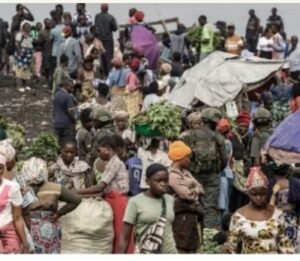Over 700 Dead in Just Five Days of Fighting in DR Congo – UN
Over 700 Dead in Just Five Days of Fighting in DR Congo – UN

In just five days of intensified fighting between January 26 and 30, over 700 people have been killed, and around 2,800 have been injured in the eastern region of the Democratic Republic of Congo (DRC), according to the UN Secretary-General’s spokesperson, Stephane Dujarric, who briefed reporters on Friday.
The World Health Organization (WHO), in collaboration with local partners, conducted an assessment between January 26 and Thursday, confirming the death toll of 700 and the 2,800 injuries. These figures are expected to rise as the situation develops. Dujarric also noted that humanitarian groups in Goma are continuing to assess the crisis, which includes extensive looting of aid organization offices and warehouses.
Goma, the largest city in North Kivu province in eastern DRC, fell under the control of the AFC/M23 rebel coalition on Monday. This marks the latest territorial gain by the group in recent weeks. The Congolese government, which accuses Rwanda of supporting M23, has not confirmed the rebels’ control of Goma but acknowledged that the city is under siege.
On Wednesday, DRC President Felix Tshisekedi vowed to mount a “vigorous and coordinated response” against the rebels, who have taken control of large swathes of the resource-rich eastern region and forced many local military units to surrender.
UN Under-Secretary-General for Peace Operations Jean-Pierre Lacroix reported on Friday that the situation in Goma remains tense, with occasional gunfire, although “overall calm is gradually returning.” He also warned that the rebel forces are advancing rapidly, now just 60 kilometers from the major city of Bukavu.
Experts have raised concerns that the ongoing conflict is severely impacting civilians in Goma, leaving them without access to basic necessities and increasing the risk of disease outbreaks.
The United Nations Office for the Coordination of Humanitarian Affairs (OCHA) reported on Friday that access to clean drinking water in Goma has been severely disrupted, forcing residents to rely on untreated water from Lake Kivu, which presents significant health risks. Dujarric warned that if urgent action is not taken, the risk of waterborne diseases will continue to rise.
TRENDING SONGS
 NPMA Appeals to Nigerian Government for Compensation After Lagos Market Fire
NPMA Appeals to Nigerian Government for Compensation After Lagos Market Fire
 Rest Every Four Hours, FRSC Issues Safety Guide for Fasting Motorists
Rest Every Four Hours, FRSC Issues Safety Guide for Fasting Motorists
 NNPC Boss Ojulari Bags UK Energy Institute Fellowship
NNPC Boss Ojulari Bags UK Energy Institute Fellowship
 Shock in Anambra: Bride Disappears Moments Before Wedding
Shock in Anambra: Bride Disappears Moments Before Wedding
 Nigerian Woman Returns ₦330 Million Accidentally Credited to Her Account
Nigerian Woman Returns ₦330 Million Accidentally Credited to Her Account
 APC Don Reach Morocco?’ VeryDarkMan Reacts to Seyi Tinubu Poster
APC Don Reach Morocco?’ VeryDarkMan Reacts to Seyi Tinubu Poster
 Bride Breaks Down in Tears as Wedding Meals Were Kept Secretly While Guests Go Home Hungry
Bride Breaks Down in Tears as Wedding Meals Were Kept Secretly While Guests Go Home Hungry
 Odogwu by Day, Robber by Night: How Marriage Joy Turned Into Tragedy
Odogwu by Day, Robber by Night: How Marriage Joy Turned Into Tragedy
 Nigerian Officials Allegedly Pocket N4–6B Weekly Through Smuggling Cartels at Seme–Badagry Border
Nigerian Officials Allegedly Pocket N4–6B Weekly Through Smuggling Cartels at Seme–Badagry Border
 Ahmad Yerima: Naval Officer to Face No Sanctions After Clash with Wike – Matawalle
Ahmad Yerima: Naval Officer to Face No Sanctions After Clash with Wike – Matawalle
Share this post with your friends on ![]()













